Habeas Corpus
Habeas Corpus: Easy to understand
During the High and Late Middle Ages, habeas corpus was crucial in ensuring that authorities couldn't imprison someone without a valid reason, responding to abuses of power by feudal lords and kings. It was important because it protected individuals from being held indefinitely without trial, promoting fairness and justice. Today, habeas corpus still matters because it ensures that governments cannot unfairly detain people without legal oversight. For example, if someone is wrongly accused of a crime, habeas corpus allows them to challenge their detention in court, potentially leading to their release. This concept protects individual freedom and prevents abuse of power, making it a vital part of our legal rights today.

Practice Version

Habeas Corpus: A legal action that requires a person who has been imprisoned to be brought to a judge or into court. Habeas corpus ensures that the government cannot detain someone without showing valid reasons in court.